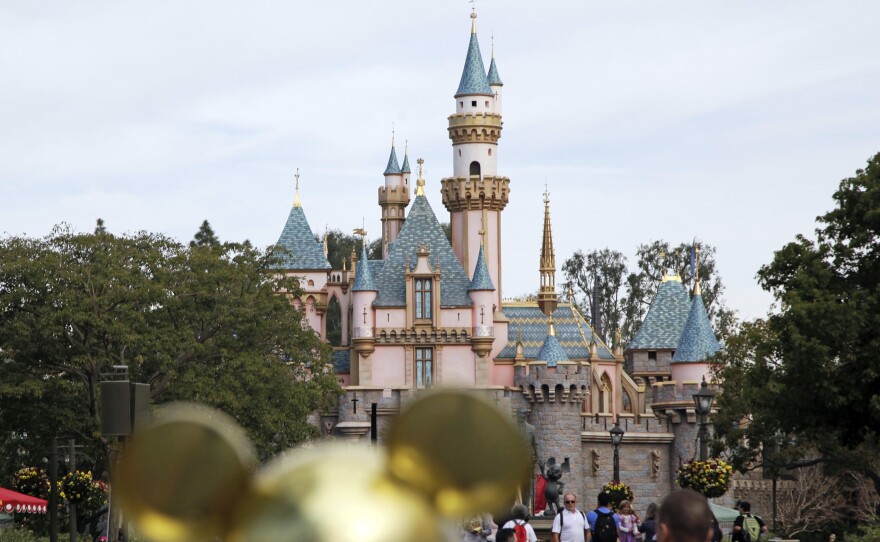Four months ago, America’s most populous state was struggling to combat a surge in coronavirus hospitalizations that packed patients into outdoor tents and killed hundreds of people each day.
On Friday, Disneyland, California's world-famous theme park, will reopen to visitors after an unprecedented 13-month closure in what tourism officials hope is a sign of the state’s rebound from the pandemic. For now, the park is allowing only in-state visitors and operating at limited capacity.
“It has such a symbolic nature to really quantifying that we’re finally rolling out of COVID,” said Caroline Beteta, president and CEO of the state tourism agency Visit California.
The news comes as California boasts the country's lowest rate of confirmed coronavirus infections and more than half of the population eligible for vaccination has received at least one dose of the shots. It's a dramatic turnaround from December, when hospitals across the state were running out of ICU beds and treating patients at overflow locations.
Now, children are returning to school, shops and restaurants are expanding business, and Gov. Gavin Newsom set June 15 as a target date to further reopen the economy, albeit with some health-related restrictions.
Theme parks were among the last businesses allowed to reopen in California, and Universal Studios and others have already thrown open the gates. That's a contrast to states with fewer restrictions such as Florida, where Disney World's Magic Kingdom resort has been up and running, though at lower-than-usual capacity, since last July.
Another major U.S. amusement park, Ohio's Cedar Point, opened last summer and will do so again for the upcoming season — only this time, it won't require masks on rides or outdoors where crowds can be avoided.
While California continues to “strongly discourage” anyone from visiting the state as tourists, the travel industry is banking on pent-up demand from its own 40 million residents for a comeback. An advertising campaign encourages Californians to travel within the state, mirroring a pitch made after the terror attacks of Sept. 11, 2001.
“We’re back to that playbook,” Beteta said. “It was very successful for us then, and we’re hoping it will be for us now.”
Disneyland is a major economic engine in California, drawing nearly 19 million in attendance the year before the coronavirus struck, according to the Themed Entertainment Association. It and other such attractions were shuttered in March 2020 as Newsom imposed the nation’s first statewide shutdown order.
The park and neighboring Disney California Adventure will reopen with a capacity that is currently capped at 25% under state health rules. Reservations are required, hugs and handshakes with Mickey and other characters are off limits, and the famous parades and fireworks shows have been shelved to limit crowding.
California currently allows state residents and fully vaccinated out-of-state visitors to attend theme parks. The state could open its economy more fully on June 15 provided vaccine supply is sufficient and hospitalizations remain stable and low.
But in a state with so many people shut in for so long, even in-state tourism could be a huge boost. Plus, Disney's California parks have long had a loyal local fan base while its Florida locations rely more heavily on international tourists, said Carissa Baker, assistant professor of theme park and attraction management at University of Central Florida’s Rosen College of Hospitality Management.
“When they reopen, they’re probably going to be pretty instantly at whatever the allowable capacity is just because there’s so many locals who go to the California parks,” Baker said.
Zach Bolger, 35, is among them. Before the closure, he took the half-hour drive down from Los Angeles County two or three times a week with his girlfriend, whom he met trading collectible pins at Disneyland.
“Just walking down Main Street and looking at the bricks on Main Street and looking at the stores or up at Walt’s window with the candle in it, all those things bring us a lot of happiness,” said Bolger, who has opening tickets for the park. “We’re definitely looking forward to the rides, but if Disneyland opened up and said, ‘All rides are closed, you can only walk around,’ we still would have bought tickets.”
The reopening is also good news for theme park employees eager to get back to work and owners of hotels and shops in the surrounding city of Anaheim, which is running a $109 million deficit due to pandemic-related closures, said Mike Lyster, a city spokesman.
Visit Anaheim President Jay Burress said the city’s convention center saw more than 300 cancellations since the pandemic and so far has rebooked about a quarter. Some events might not be due to return to the West Coast for years or could get moved to states with fewer restrictions, Burress said, but added he believes the reopening of Disneyland and other attractions is promising.
“We’re not out of the woods, but at least we’re seeing some light for future,” he said.
Disneyland is expected to reopen popular rides such as Space Mountain and Dumbo the Flying Elephant. But there will be changes to the park, with masks required and no live theater performances scheduled. This is how Disney started out at its Florida theme park and gradually phased back in entertainment, Baker said.
Earlier this week, Disneyland lit up its hallmark Sleeping Beauty castle and released a video tribute to employees. “There’s a great big beautiful tomorrow ahead for all of us,” said Ken Potrock, president of Disneyland Resort.





